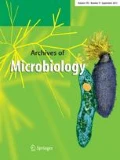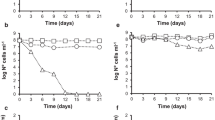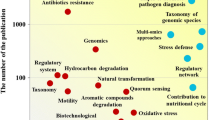Abstract
Acinetobacter baumannii possesses a tremendous potential to thrive under hostile conditions. To learn more about its survival strategy and capacity to persist in the environment, we studied the effect of temperature, nutrient deprivation and dryness on the long-term survival of two A. baumannii strains (ATCC 19606T and a clinical isolate). Our results revealed that both strains show a great persistence under stress that appears to involve a bust-and-boom strategy. Bacterial survival was differentially affected by temperature and physical environment: Desiccation favored cell resistance to stress at 20 and 37 °C, while survival in aqueous environments was temperature dependent and led to changes in several cellular characteristics. In addition, we tested the ability of the A. baumannii ATCC 19606T strain to form biofilms by monitoring the expression of adhesion-/biofilm-related genes (ompA, bfmR and csuAB). The observed downregulation of these genes suggests that the potential difficulties to adhere to solid surfaces and form biofilms likely limit the capacity of starved cells to spread and colonize abiotic surfaces.




Similar content being viewed by others
References
Arana I, Orruño M, Pérez-Pascual D, Seco C, Muela A, Barcina I (2007) Inability of Escherichia coli to resuscitate from the viable but nonculturable state. FEMS Microbiol Ecol 62:1–11. doi:10.1111/j.1574-6941.2007.00362.x
Arana I, Muela A, Orruño M, Seco C, Garaizabal I, Barcina I (2010) Effect of temperature and starvation upon survival strategies of Pseudomonas fluorescens CHA0: comparison with Escherichia coli. FEMS Microbiol Ecol 74:500–509. doi:10.1111/j.1574-6941.2010.00979.x
Barcina I, Arana I (2009) The viable but nonculturable phenotype: a crossroads in the life-cycle of non-differentiating bacteria? Rev Environ Sci Bio/Technol 3:245–255. doi:10.1007/s11157-009-9159-x
Bartual SG, Seifert H, Hippler C, Domínguez-Luzon MA, Wisplinghoff H, Rodríguez-Valera F (2005) Development of a Multilocus Sequence Typing scheme for characterization of clinical isolates of Acinetobacter baumannii. J Clin Microbiol 43:4382–4390. doi:10.1128/JCM.43.9.4382-4390.2005
Chang KC, Kuo HY, Tang CY, Chang CW, Lu CW, Liu CC, Lin HR, Chen KH, Liou ML (2014) Transcriptome profiling in imipenem-selected Acinetobacter baumannii. BMC Genom 15:815. doi:10.1186/1471-2164-15-815
Choi CH, Hyun SH, Lee JY, Lee JS, Lee YS, Kim SA, Chae JP, Yoo SM, Lee JC (2008) Acinetobacter baumannii outer membrane protein A targets the nucleus and induces cytotoxicity. Cell Microbiol 10:309–319. doi:10.1111/j.1462-5822.2007.01041.x
Costerton JW, Stewart PS, Greenberg EP (1999) Bacterial biofilms: a common cause of persistent infections. Science 284:1318–1322. doi:10.1126/science.284.5418.1318
Diancourt L, Passet V, Nemec A, Dijkshoorn L, Brisse S (2010) The population structure of Acinetobacter baumannii: expanding multiresistant clones from an ancestral susceptible genetic pool. PLoS One 5:e10034. doi:10.1371/journal.pone.0010034
Espinal P, Martí S, Vila J (2012) Effect of biofilm formation on the survival of Acinetobacter baumannii on dry surfaces. J Hosp Infect 80:56–60. doi:10.1016/j.jhin.2011.08.013
Eveillard M, Kempf M, Belmonte O, Pailhoriés H, Joly-Guillou ML (2013) Reservoirs of Acinetobacter baumannii outside the hospital and potential involvement in emerging human community-acquired infections. Int J Infect Dis 17:e802–e805. doi:10.1016/j.ijid.2013.03.021
Gaddy JA, Actis LA (2009) Regulation of Acinetobacter baumannii biofilm formation. Future Microbiol 4:273–278. doi:10.2217/fmb.09.5
Gayoso CM, Mateos J, Méndez JA, Fernández-Puente P, Rumbo C, Tomás M, Martínez de Ilarduya O, Bou G (2014) Molecular mechanisms involved in the response to desiccation stress and persistence in Acinetobacter baumannii. J Proteome Res 13:460–476. doi:10.1021/pr400603f
Hall-Stoodley L, Costerton JW, Stoodley P (2004) Bacterial biofilms: from the natural environment to infectious diseases. Nature Rev Microbiol 2:95–108. doi:10.1038/nrmicro821
Hamouda A, Evans BA, Towner KJ, Amyes SGB (2010) Characterization of epidemiologically unrelated Acinetobacter baumannii isolates from four continents by use of multilocus sequence typing, pulsed-field gel electrophoresis, and sequence-based typing of bla OXA-51-like genes. J Clin Microbiol 48:2476–2483. doi:10.1128/JCM.02431-09
Hobbie JE, Daley RJ, Jasper S (1977) Use of nucleopore filters for counting bacteria by epifluorescence microscopy. Appl Environ Microbiol 33:1225–1228
Houang ETS, Sormunen RT, Lai L, Chan CY, Leong ASY (1998) Effect of desiccation on the ultrastructural appearances of Acinetobacter baumannii and Acinetobacter lwoffii. J Clin Pathol 51:786–788. doi:10.1136/jcp.51.10.786
Jawad A, Snelling AM, Heritage J, Hawkey PM (1998) Exceptional desiccation tolerance of Acinetobacter radioresistens. J Hosp Infect 39:235–240. doi:10.1016/S0195-6701(98)90263-8
Joux F, Lebaron P, Troussellier M (1997) Succession of cellular states in Salmonella typhimurium population during starvation in artificial seawater microcosms. FEMS Microbiol Ecol 22:65–76. doi:10.1111/j.1574-6941.1997.tb00357.x
Karunasagar I, Karunasagar I (2005) Retention of pathogenicity in viable nonculturable pathogens. In: Belkin S, Colwell RR (eds) Oceans and health: pathogens in the marine environment. Springer, New York, pp 361–371
Kempf M, Rolain JM, Azza S, Diene S, Joly-Guillou ML, Dubourg JG, Colson P, Papazian L, Richet H, Fournier PE, Ribeiro A, Raoult D (2012) Investigation of Acinetobacter baumannii resistance to carbapenems in Marseille hospitals, south of France: a transition from an epidemic to an endemic situation. APMIS 121:64–71. doi:10.1111/j.1600-0463.2012.02935.x
Lambiase A, Piazza O, Rossano F, Del Pezzo M, Tufano R, Catania MR (2012) Persistence of carbapenem-resistant Acinetobacter baumannii strains in an Italian intensive care unit during a forty-six month study period. New Microbiol 35:199–206
Landini P (2009) Cross-talk mechanisms in biofilm formation and responses to environmental and physiological stress in Escherichia coli. Res Microbiol 60:259–266. doi:10.1016/j.resmic.2009.03.001
Lee HW, Koh YM, Kim J, Lee JC, Lee YC, Seol SY, Cho DT, Kim J (2008) Capacity of multidrug-resistant clinical isolates of Acinetobacter baumannii to form biofilm and adhere to epithelial cell surfaces. Clin Microbiol Infect 14:49–54. doi:10.1111/j.1469-0691.2007.01842.x
Lemke M, Leff L (2006) Culturability of stream bacteria: assemblage and population level responses. Microb Ecol 51:365–374. doi:10.1007/s00248-006-9026-z
Lever MA, Rogers KL, Lloyd KG, Overmann J, Schink B, Thauer RK, Hoehler TM, Jørgensen BB (2015) Life under extreme energy limitation: a synthesis of laboratory-and field-based investigations. FEMS Microbiol Rev. doi:10.1093/femsre/fuv020
Marks LR, Reddinger RM, Hakansson AP (2014) Biofilm formation enhances fomite survival of Streptococcus pneumoniae and Streptococcus pyogenes. Infect Immun 82:1141–1146. doi:10.1128/IAI.01310-13
Oliver JD (2010) Recent findings on the viable but nonculturable state in pathogenic bacteria. FEMS Microbiol Rev 34:415–425. doi:10.1111/j.1574-6976.2009.00200.x
O’Toole GA, Kolter R (1998) Initiation of biofilm formation in Pseudomonas fluorescens WCS365 proceeds via multiple, convergent signalling pathways: a genetic analysis. Mol Microbiol 28:449–461. doi:10.1046/j.1365-2958.1998.00797.x
Rittershaus ESC, Baek SH, Sassetti CM (2013) The normalcy of dormancy: common themes in microbial quiescence. Cell Host Microbe 13:643–651. doi:10.1016/j.chom.2013.05.012
Roca D, Espinal P, Vila-Farres X, Vila J (2012) The Acinetobacter baumannii oxymoron: comensal hospital dweller turned pan-drug resistant menace. Front Microbiol 3:1–30. doi:10.3389/fmicb.2012.00148
Roszak DB, Colwell RR (1987) Survival strategies of bacteria in the natural environment. Microbiol Rev 51:365–379
Stepanović S, Vuković D, Dakić I, Savić B, Svabić-Vlahović M (2000) A modified microtiter-plate test for quantification of staphylococcal biofilm formation. J Microbiol Methods 40:175–179. doi:10.1016/S0167-7012(00)00122-6
Tomaras AP, Flagler MJ, Dorsey CW, Gaddy JA, Actis LA (2008) Characterization of a two-component regulatory system from Acinetobacter baumannii that controls biofilm formation and cellular morphology. Microbiology 154:3398–3409. doi:10.1099/mic.0.2008/019471-0
Towner KJ (2009) Acinetobacter: an old friend, but a new enemy. J Hosp Infect 73:355–363. doi:10.1016/j.jhin.2009.03.032
Webster C, Towner KJ, Humphreys H (2000) Survival of Acinetobacter on three clinically related inanimate surfaces. Infect Control Hosp Epidemiol 21:246. doi:10.1086/503214
Wendt C, Dietze B, Dietz E, Rüden H (1997) Survival of Acinetobacter baumannii on dry surfaces. J Clin Microbiol 35:1394–1397
Zhang Y (2014) Persisters, persistent infections and the Yin-Yang model. Emerg Microb Infect 3:e3. doi:10.1038/emi.2014.3
Acknowledgments
Real-time PCR analysis and scanning electron microscopy of A. baumannii preparations were performed at the Advanced Research Core Facilities (SGIker) of the University of Basque Country UPV/EHU (Gene Expression Unit of the Genomics Core Facility and Analytical and High-Resolution Microscopy in Biomedicine Service). This work was supported by the research projects S-PE12UN59 and S-PE13UN059 from the Basque Government and EHU13/57 from the Basque Country University (UPV/EHU), as well as Basque Government Predoctoral Grants BFI-2011-84 to Z. Bravo and BFI-2011-85 to C. Parada. V.R. Kaberdin was supported by IKERBASQUE (Basque Foundation for Science). Authors thank Prof. J. Ramos-Vivas (Department of Microbiology, Hospital Universitario Marqués de Valdecilla-IDIVAL, Santander, Spain) for providing them with the clinical Acinetobacter baumannii isolate.
Author information
Authors and Affiliations
Corresponding author
Additional information
Communicated by Erko Stackebrandt.
Rights and permissions
About this article
Cite this article
Bravo, Z., Orruño, M., Parada, C. et al. The long-term survival of Acinetobacter baumannii ATCC 19606T under nutrient-deprived conditions does not require the entry into the viable but non-culturable state. Arch Microbiol 198, 399–407 (2016). https://doi.org/10.1007/s00203-016-1200-1
Received:
Revised:
Accepted:
Published:
Issue Date:
DOI: https://doi.org/10.1007/s00203-016-1200-1




